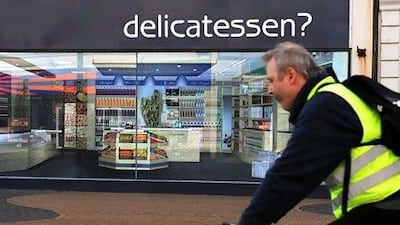You've got to fake it, to make it, goes the mantra. Somewhat implausibly, though, we're talking local shops and not some wannabe celebrity.
Amid the doom and gloom on the UK's high streets, councils are turning to fake shops to try to persuade entrepreneurs and independent retailers to take leases in their benighted high streets.
Harrow, in west London, is the latest council to pay thousands to a company called Shopjacket to create what is claimed to be the capital's first high-tech "fake shop".
A former dog-grooming parlour (even our pets are on austerity measures) has been made over with a weatherproof aluminium fascia, emblazoned with the slogan: this retail space could be yours.
One in five shops in north Harrow is empty, a figure that is slightly worse than the national average of 15 per cent for vacancies, according to the Local Data Company, a research firm.
In some towns - the likes of Rotherham and Margate - the vacancy figure is close to a third as retailers struggle to pull themselves out of the mire, despite the fact the recession has ended.
Consumers in the UK are struggling. For the first time in more than three decades, real incomes are growing at a slower rate than inflation, with soaring food, petrol and household energy bills gnawing into disposable incomes.
The effects of this are now being felt. Retail sales, which grew strongly in April thanks to Easter and the royal wedding, have since been disappointing and a string of UK retailers have delivered poor trading statements.
The latest figures from the Confederation of British Industry showed that sales of goods on Britain's high streets this month fell for the first time in a year.
Combine the belt-tightening with some of the prevailing trends in the retail world - internet shopping, the big brands becoming ever more dominant and the desire by chain retailers to operate from large, big-box units in out-of-town locations - and there seems little hope of rescuing the high street.
A fake facade looks more like a sticking plaster than a panacea.
The high street's only hope is the independent retailer - and in the widest possible sense of the word: a retailer of coffee, a sandwich seller or someone who sells osteopathy or hairdressing, not just traditional shopkeepers.
In a typical north London street near my home, a couple of "shops" have opened in the past two months. These are a tiny cafe and a bijou deli.
These new business owners are taking a risk, but the shops have proved popular and locals have a vested interest in seeing them succeed.
Council landlords who want to reinvigorate their high streets and shopping parades should look at giving rate rebates and cutting rents to a minimum, rather than spending money on window dressing.
At the same time, the big retailers - Arcadia, Sainsbury's, Mothercare - have tired of running outlets in poky high street units. Their customers cannot park easily near them and the pavement outside is often dirty or blocked by ugly street furniture.
Shoppers and retailers would far rather have a nice new shopping centre - out-of-town or not - in which to display or buy their wares.
But the construction downturn has caused problems for retailers who cannot find enough space in the premier shopping centres, where they all want to be.
Europe's largest urban shopping centre will open in Stratford, east London, in September, next to the 2012 Olympic park.
Westfield's Stratford City mall is one of only a few new major schemes in development, after the credit crunch halted many projects.
That means the bigger, more successful retailers will spend more time and money than ever, on making sure they are in the latest mall where they can control the customer ambience and shopping experience - a trick they learnt from the supermarkets.
They are rapidly leaving "secondary" towns to sink or swim.
The latest report on the retail market from the surveying company Colliers underlines that there is no easy way to reverse the rot on the high street, even with the government appointment of straight-talking TV retail guru, Mary Portas, to revitalise British town centres.
Colliers says that almost a quarter of British towns in its survey of 364 are "failing" and a further 42 are "degenerating".
The omens are not good. Harrow's fake shop may be as close to the real thing as it gets, in the next few years.

